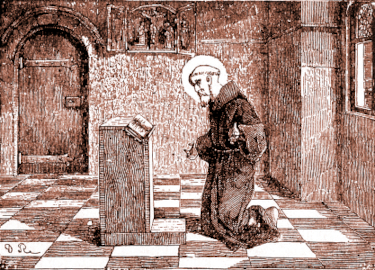Lives of the Saints
Our Models and Protectors
Spiritual Bouquet:
April 10

Saint Bademus
Martyr
(† 376)
Bademus was originally a rich and noble citizen of Bethlapeta in Persia, who sold his rich possessions to follow Christ, then gave the greater part of the proceeds to the poor. He reserved just enough to found a monastery near that city, to which he retired with several other persons, and then governed it with great sanctity. He conducted his religious in the paths of perfection with sweetness, prudence, and charity.
To crown his virtue, God permitted him, with seven of his monks, to be apprehended by the followers of King Sapor in the thirty-sixth year of that king's persecution. He lay four months in a dungeon, loaded with chains, and during this lingering martyrdom received every day a cruel flagellation. But he triumphed over his torments by the patience and joy with which he suffered them for Christ.
At the same time a prince named Nersan, who was a Christian, was cast into prison and his goods confiscated because he refused to adore the sun. At first he seemed resolute, but at the sight of tortures his constancy failed him, and he promised to conform if he could be delivered. The king, to test whether his change was sincere, ordered Bademus to be brought where Nersan was kept in the royal palace, and sent word to Nersan that if he would slay the abbot, he would be restored to his liberty and former dignities. The apostate accepted the condition; a sword was put into his hand, and he advanced to plunge it into the breast of the abbot. But being seized with a sudden terror, he stopped short, and remained some time unable to lift up his arm to strike; he had neither courage to repent, nor heart to accomplish his crime.
Finally he hardened himself and continued with a trembling hand to aim at the martyr's sides. Fear, shame, remorse, and respect made his strokes forceless and unsteady; and so great was the number of his victim's wounds that the bystanders were in admiration at his invincible patience. Saint Bademus reproached his executioner, saying, What will you do on the day when you will have to render an account of your actions, and hear the sentence of your condemnation? I offer myself willingly to die for the glory of my Lord Jesus Christ, but I would prefer to die by another hand than yours! The pagans themselves were horrified at the cruelty of the king, the long martyrdom, and the perfidious acts of the apostate.
Saint Bademus suffered on the 10th of April in the year 376. His body was cast out of the city, but secretly carried away and interred by the Christians. A short time afterwards Nersan fell into public disgrace, and perished by the sword. The disciples of the Saint were released from their chains four years later, at the death of King Sapor.
Reflection. What ravishing delights does the soul taste which is accustomed to converse, in the heaven of its own interior, with the Three Persons of the adorable Trinity!
Little Pictorial Lives of the Saints, a compilation based on Butler's Lives of the Saints and other sources by John Gilmary Shea (Benziger Brothers: New York, 1894); Les Petits Bollandistes: Vies des Saints, by Msgr. Paul Guérin (Bloud et Barral: Paris, 1882), Vol. 4